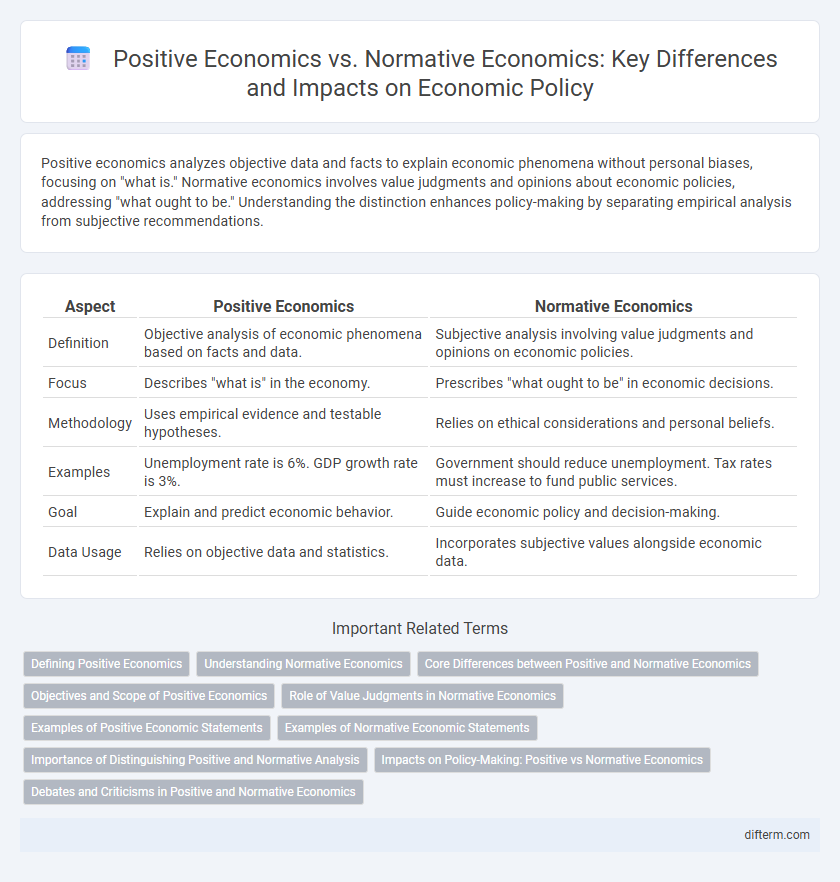Positive economics analyzes objective data and facts to explain economic phenomena without personal biases, focusing on "what is." Normative economics involves value judgments and opinions about economic policies, addressing "what ought to be." Understanding the distinction enhances policy-making by separating empirical analysis from subjective recommendations.
Table of Comparison
| Aspect | Positive Economics | Normative Economics |
|---|---|---|
| Definition | Objective analysis of economic phenomena based on facts and data. | Subjective analysis involving value judgments and opinions on economic policies. |
| Focus | Describes "what is" in the economy. | Prescribes "what ought to be" in economic decisions. |
| Methodology | Uses empirical evidence and testable hypotheses. | Relies on ethical considerations and personal beliefs. |
| Examples | Unemployment rate is 6%. GDP growth rate is 3%. | Government should reduce unemployment. Tax rates must increase to fund public services. |
| Goal | Explain and predict economic behavior. | Guide economic policy and decision-making. |
| Data Usage | Relies on objective data and statistics. | Incorporates subjective values alongside economic data. |
Defining Positive Economics
Positive economics analyzes factual data and objective statements to describe and explain economic phenomena without judgment. It relies on empirical evidence and testable hypotheses to predict economic outcomes and understand cause-effect relationships. This approach contrasts with normative economics, which involves value-based judgments and prescriptive recommendations.
Understanding Normative Economics
Normative economics involves value judgments and opinions about what the economy should be like or what policies ought to be implemented, emphasizing ethical considerations and societal goals. It contrasts with positive economics, which objectively analyzes economic phenomena and predicts outcomes based on data without subjective bias. Understanding normative economics is essential for policy-making, as it guides decisions by incorporating beliefs about fairness, justice, and desired economic welfare.
Core Differences between Positive and Normative Economics
Positive economics analyzes economic phenomena using objective data and factual statements, focusing on what is, while normative economics involves value judgments and prescribes what ought to be. The core difference lies in positive economics being descriptive and testable, whereas normative economics is prescriptive and subjective. This distinction shapes policy debates by separating empirical evidence from ethical considerations.
Objectives and Scope of Positive Economics
Positive economics focuses on objective analysis and empirical evidence to describe and explain economic phenomena without value judgments. It aims to develop testable hypotheses and forecasts based on data, addressing what is and how the economy functions. The scope includes studying measurable factors such as supply and demand, inflation rates, and employment levels to inform policy decisions objectively.
Role of Value Judgments in Normative Economics
Normative economics relies heavily on value judgments to prescribe economic policies based on what ought to be rather than what is, contrasting with positive economics that focuses on objective analysis and factual statements. These value judgments influence decisions on resource allocation, income distribution, and social welfare, shaping policy recommendations according to ethical beliefs and societal goals. Understanding the role of subjective preferences in normative economics is crucial for interpreting policy debates and economic prescriptions.
Examples of Positive Economic Statements
Positive economics examines objective, fact-based statements such as "The unemployment rate in the United States is 6.2% as of March 2024" or "Increasing the minimum wage to $15 per hour will affect employment levels." These statements can be tested and validated through empirical data and statistical analysis. Unlike normative economics, which involves value judgments, positive economics relies solely on measurable phenomena and cause-effect relationships.
Examples of Normative Economic Statements
Normative economics involves value-based judgments about economic policies, such as "The government should increase the minimum wage to reduce poverty" or "Healthcare ought to be free for all citizens." These statements reflect opinions on what economic outcomes ought to be, rather than objective descriptions or predictions. Policymakers often rely on normative economics when proposing reforms aligned with societal welfare goals.
Importance of Distinguishing Positive and Normative Analysis
Distinguishing positive economics from normative economics is crucial for objective policy evaluation and informed decision-making. Positive economics relies on empirical data and factual statements to describe economic phenomena, whereas normative economics incorporates value judgments and subjective opinions about what economic outcomes should be. Clarity in this distinction helps economists and policymakers avoid biases, enabling transparent debate on economic strategies and effective allocation of resources.
Impacts on Policy-Making: Positive vs Normative Economics
Positive economics provides empirical analysis and objective data that help policymakers predict the outcomes of economic decisions, ensuring evidence-based policy formulation. Normative economics introduces value judgments and ethical considerations, influencing policy goals by reflecting societal priorities and preferences. The interplay between both branches shapes effective policies by balancing factual insights with normative objectives.
Debates and Criticisms in Positive and Normative Economics
Debates in positive economics revolve around its claim to objectivity, with critics arguing that data interpretation often involves implicit value judgments, challenging the notion of pure fact-based analysis. Normative economics faces criticism for its reliance on subjective ethical perspectives, making consensus difficult and policy recommendations often contentious. The tension between the two highlights the difficulty in separating empirical evidence from value-laden decisions in economic discourse.
Positive Economics vs Normative Economics Infographic

 difterm.com
difterm.com